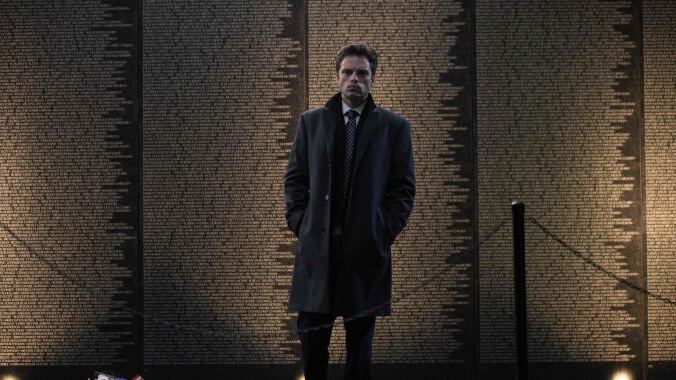There’s star power but no drama in feature-length salute to sacrifice The Last Full Measure

More of a two-hour ceremony than a movie, The Last Full Measure recounts strenuous real-life efforts to secure a very belated, posthumous Medal Of Honor for William H. Pitsenbarger, an Air Force pararescueman who was killed in Vietnam while saving fellow soldiers’ lives. It’s a full-throated, misty-eyed celebration of heroism—“Thank you for your service” writ large—and only a churl would point out that watching it isn’t far removed from attending a military funeral, inspiring the same suite of emotions. Hagiography doesn’t magically becomes less tedious simply because its subject made the ultimate sacrifice for his country, however, and this stolid, mournful drama does little more than solicit the viewer’s respect and admiration for Pitsenbarger, whose entire life gets reduced to a single act of uncomplicated nobility.
In theory, the film’s complex figure is Scott Huffman (Sebastian Stan), a Defense Department staffer who’s tasked with handling the decoration upgrade request. (Pitsenbarger was originally awarded the Air Force Cross—quite an honor in its own right, but still less distinguished than the rarely given Medal Of Honor.) Ambitious and distracted, Huffman initially perceives this assignment as annoying busywork, but becomes more invested after speaking with Pitsenbarger’s friend and fellow pararescueman, Thomas Tulley (William Hurt). What follows is a more inspiring riff on Citizen Kane, as Huffman travels the world interviewing other Vietnam vets (played by such aging powerhouses as Samuel L. Jackson, Ed Harris, John Savage, and—in his final screen appearance—the late Peter Fonda), hearing nothing but praise for the man’s courage and guilt at having survived the war when he did not. We also meet Pitsenbarger’s parents (Diane Ladd and Christopher Plummer), one of whom has terminal cancer and hopes to see justice done before he dies.
There’s no questioning The Last Full Measure’s good intentions. (Hell, its title comes from the Gettysburg Address.) Writer-director Todd Robinson, whose previous films include the submarine thriller Phantom, clearly wants to instill or reactivate Americans’ feeling of pride in our military and gratitude for those who serve; the movie ends with everyone on screen—and, implicitly, the viewer—being urged to stand and pay tribute. Making that sentiment compelling for two hours, however, is a tall order. Recurring flashbacks to the rescue mission in which Pitsenbarger (Jeremy Irvine) was killed look as if they were shot on a backlot, and depict him practically as an angel of mercy. Present-tense scenes (which take place in the late ’90s; Pitsenbarger received his Medal Of Honor in 2000) lean heavily on weepy speeches, with Hurt even getting a full-bore “It’s not your fault” meltdown staged in front of the Vietnam Memorial wall.
By far the film’s most effective element is Huffman’s gradual realization that he was given this assignment in the expectation that he’d bury it, thereby preserving the reputation of a U.S. Senator and likely future secretary of defense. The politicking involved is straight out of The West Wing (which is probably why Bradley Whitford was cast as Huffman’s superior), but it occupies only about the same 10 or 15 minutes that it would have been allotted as the C plot in a post-Sorkin West Wing episode. Ultimately, we’re just meant to recognize bravery and salute. The movie’s not strictly necessary for that.